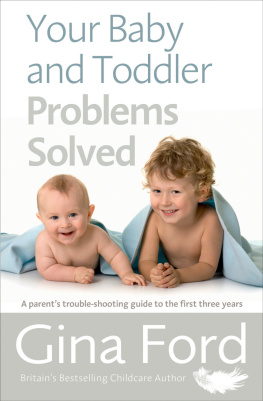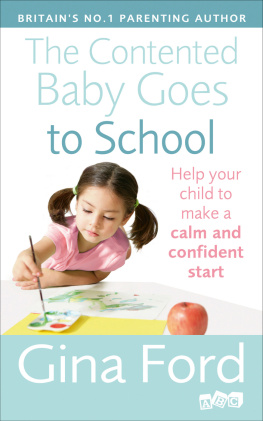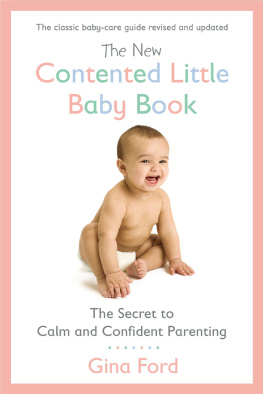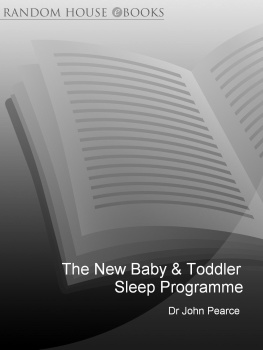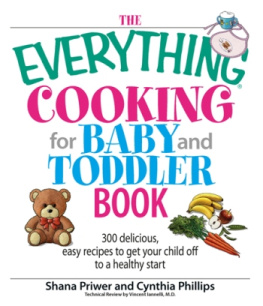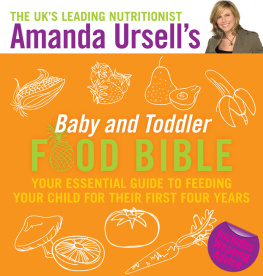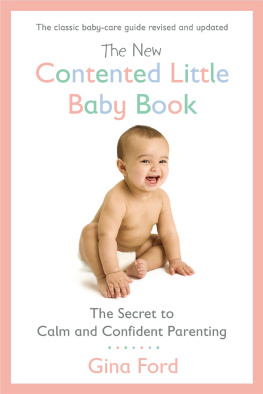About the Author
Gina Fords Contented Little Baby Book became a runaway bestseller when it was first published in 1999. Her advice and methods have been a godsend to tired, stressed parents throughout the world and have helped a generation of children go to bed on time and sleep calmly through the night.
www.contentedbaby.com
About the Book
Solving your childcare problems starts here.
Organised chronologically for easy reference and with detailed case studies, Gina Ford shares her practical, easy and realistic solutions to the most common toddler challenges.
It is Ginas belief that sleeping and feeding are intrinsically linked and that all too often babies and toddlers are subjected to unnecessary sleep training methods. Whether your baby or toddler is a fussy feeder, refuses to settle at bedtime or is waking up several times a night, the holistic and gentle approach in this book will ensure that your childs feeding and sleeping needs are fully met, and that you resolve the root cause of the problem for good.
Contents
Your Baby and Toddler Problems Solved
Gina Ford

Introduction
When you become parents to a newborn baby, you are entering a wonderfully exciting world, but the first few months are often quite daunting. Parents may feel unprepared for the overwhelming change to their lives that a new baby can bring. It will be an enriching experience, but initially you may feel anxious about caring for the tiny new baby who is entirely dependent on you.
Over the years I have worked with many thousands of parents, and helped to find solutions to the challenges they are having with their babies and their toddlers. My first book, The Contented Little Baby Book (published in 1999), was based on my experiences of working with over 300 babies and their families, and since then I have communicated with thousands of parents through my consultancy work and the Contented Baby website, www.contentedbaby.com, which I set up to help parents who felt isolated as they navigated their way through those early months. Through this direct contact, I have become familiar with the most common problems new parents experience. I know how tired and anxious mums and dads can become, desperately seeking immediate solutions to their problems and they dont want to search hard for the answers. With that in mind, I decided to write a problem-solving guide, to provide parents with the answers to the questions they most frequently seek. This book addresses the most common problems I come across for parents who need straightforward easy-to-access solutions.
I have divided the chapters up by age in order to focus on the range of issues that can arise at different stages of your babys development. Each chapter will begin with a brief explanation of what parents might expect at that age, highlighting some of the areas where concerns can arise. I will then outline and explore some of the most common problems I encounter in my consultations giving a brief explanation of the problem as you may experience it and then providing the different solutions that can be used to address it.
Within each chapter problems are grouped under feeding, sleeping and general problems. What I have found, however, is that all too often a parent comes to me with a sleeping problem that is actually a feeding problem diet can have a huge impact on sleep or will come to me with a feeding problem that is caused by overtiredness, which makes feeding difficult. This isnt just true for babies; with older children too, eating the wrong type of food can lead to behavioural problems. Its surprising how rarely the overlap between these issues is acknowledged, with so much of the advice offered today being focused on one specific area rather than looking at the bigger picture. I would therefore encourage you to read both sections as what you think is a feeding problem may in fact be caused by something to do with your babys sleep.
When parents come to me for consultations, I always aim to get as broad a picture as possible of their babys routine, sleep and feeding patterns so that I can see where the links in the chain may be weak or broken, and work out which issues need addressing. I have drawn on all the latest research in the field of childcare, in order to ensure that my conclusions take account of the most recent theories and developments.
You will discover that some of the same problems crop up more than once in the book as you progress from month to month. This is because, as your baby grows and develops, the reasons he may be feeding fussily or waking several times in the night will change so I have tried to take account of what is happening at his age.
Whether you have a specific problem that you are hoping to solve, or just wish to learn more generally about the issues that can arise at different stages of your babys development, I hope that you will find much of interest in the pages ahead. I firmly believe that many of the challenges parents face are best addressed in a holistic way, and that this will help ensure that you have a happy and contented baby or toddler.
Gina
PART 1
Understanding the Basics
1
The Contented Little Baby Philosophy and Routines
I remember my first babysitting assignment with a six-month-old baby. I arrived at the house around 6.45pm and the baby had just been put to bed. I heard a loud wailing from the nursery upstairs, but was assured by the mother that little Joseph would soon settle within 10 minutes. True to his mothers word within eight minutes Joseph was fast asleep and remained so until the parents arrived home around 11pm.
When I first started caring for babies nearly 40 years ago, strict four-hourly feeding routines with a bedtime around 6.30/7pm was the norm/fashion and this was the approach that was adopted by the majority of parents. Never in a million years did any of those parents I worked for ever think that what they were doing was uncaring. They believed that being a good parent wasnt just about loving their baby, but ensuring that their baby was well fed and slept soundly, so that long-term sleeping and feeding problems were avoided.
Fast forward 10 years and attitudes to parenting changed, as approaches like baby-led and attachment parenting became the norm/fashion. Out went the strict four-hourly routines, regular feeds and early bedtimes and in came babies feeding every two hours around the clock, watching the 10 oclock news and sleeping with their parents. Over the next 10 years I worked as a maternity nurse with many different families, some still following the strict four-hourly feeding routines and many more following the more relaxed baby-led approach. Working with so many different families gave me an incredible insight into the different strategies on child rearing. I could see benefits and pitfalls in both approaches and my instinct told me that there had to be a middle ground: an approach somewhere in between the strict old-fashioned four-hourly feeding routines where a baby would not be fed before the scheduled time, regardless of whether they were hungry or not, to the other extreme where the least whimper from a baby, irrespective of what they really needed, prompted a reaction of feeding them.
As the popularity of baby-led parenting increased, so did the use of the famous controlled crying method of sleep training. After months and months of feeding two hourly around the clock and babies rarely sleeping more than a two-hour stretch at a time, a huge number of sleep deprived parents would resort to sleep training their baby using the controlled crying method. I was convinced that there must be another way of getting babies to sleep through the night, without having to endure the crying that is inevitable with controlled crying.

